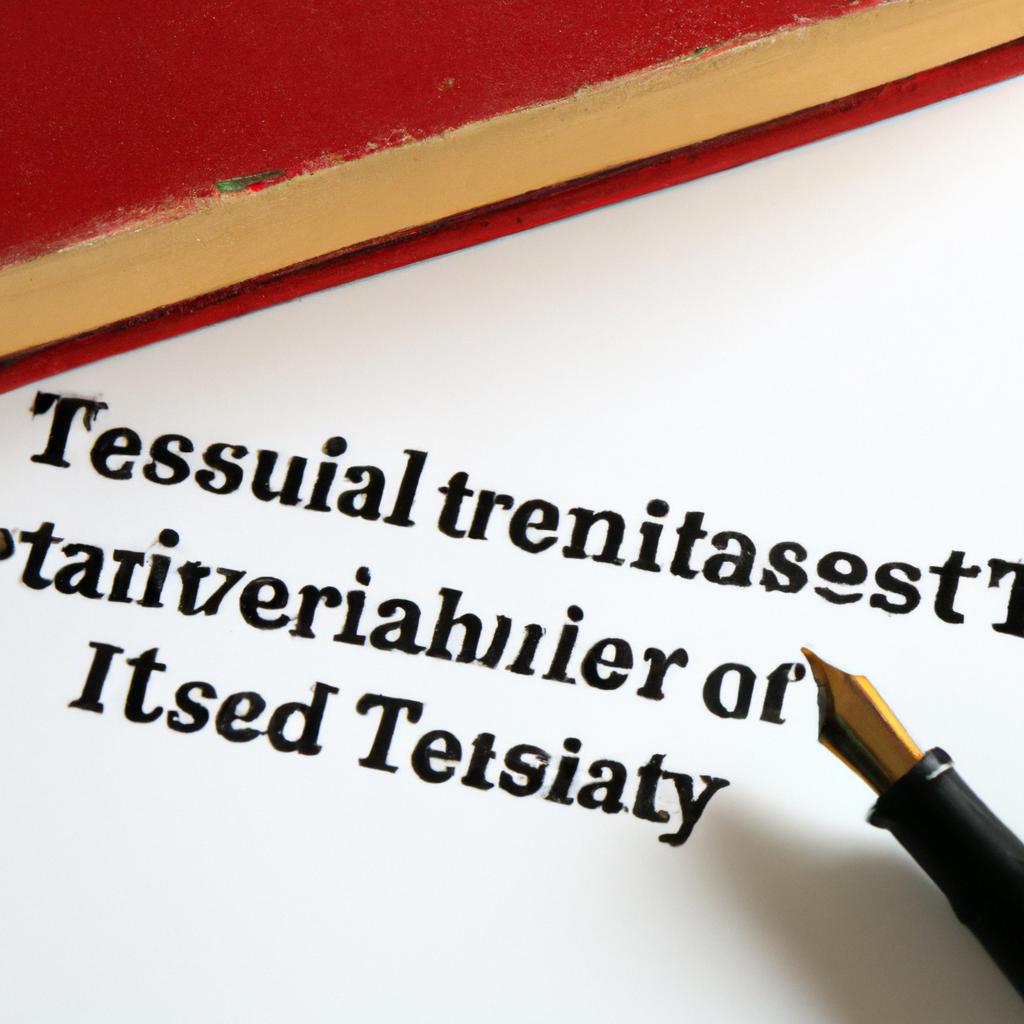When it comes to estate planning, one question that often arises is whether a testamentary trust is irrevocable. Testamentary trusts are powerful tools that can provide protection and peace of mind for your loved ones after you pass away. In this article, we will explore the fundamentals of testamentary trusts and determine whether they are truly irrevocable. As experienced estate planning attorneys at Morgan Legal Group in New York City, we specialize in navigating the complexities of Wills and trusts to help our clients secure their legacy for future generations. Join us as we delve into the world of testamentary trusts and uncover the truth behind their irrevocability.
Is a Testamentary Trust Irrevocable: Understanding the Implications
When considering setting up a testamentary trust, it is essential to understand the implications of its irrevocability. A testamentary trust is typically created within a will and only takes effect upon the testator’s death. Unlike a living trust, which can be changed or revoked during the grantor’s lifetime, a testamentary trust is generally irrevocable once the testator passes away. This means that once the trust is established, the terms cannot be altered, and the assets held within it cannot be easily removed or distributed differently.
It is crucial for individuals to carefully consider the long-term implications of creating an irrevocable testamentary trust. While the trust provides benefits such as asset protection and estate tax planning, it also limits the flexibility to adapt to changes in circumstances. Before establishing a testamentary trust, it is advisable to consult with an experienced estate planning attorney to fully understand the legal and financial ramifications of irrevocability.

Estate Planning Considerations Regarding Testamentary Trusts
When considering estate planning options, testamentary trusts provide a valuable tool for individuals looking to protect their assets and provide for their loved ones after they pass away. One common question that arises in the realm of testamentary trusts is whether they are irrevocable.
Is a testamentary trust irrevocable?
Yes, a testamentary trust is typically irrevocable once it is established by a person’s Will. This means that the terms and conditions of the trust cannot be changed or revoked after the person’s passing. It is important to carefully consider all aspects of a testamentary trust and seek guidance from an experienced estate planning attorney to ensure that the trust aligns with your wishes and goals for the distribution of your assets.
Important Factors to Consider Before Creating a Testamentary Trust
When considering the creation of a testamentary trust, one important factor to keep in mind is the irrevocability of the trust. A testamentary trust is typically irrevocable, meaning that once it is created, it cannot be changed or revoked by the trustor. This is an important consideration as it ensures that the assets placed in the trust are protected and distributed according to the trustor’s wishes. It is essential to carefully consider all aspects of the trust before creating it to avoid any unforeseen complications or disputes in the future.
Another key factor to consider before creating a testamentary trust is choosing the right trustee. The trustee plays a crucial role in administering the trust and ensuring that the assets are managed and distributed in accordance with the trustor’s instructions. It is important to select a trustee who is trustworthy, reliable, and capable of fulfilling their fiduciary duties. Additionally, the trustee should have a good understanding of the trust’s terms and be able to communicate effectively with the beneficiaries. By carefully selecting the right trustee, you can help ensure that your assets are protected and distributed in the way you intended.
Navigating the Legal Framework Surrounding Testamentary Trusts
When considering the intricacies of testamentary trusts, many individuals wonder whether these trusts are irrevocable. The answer lies in the nature of testamentary trusts, which are established through a person’s will and only take effect upon their death. It is important to understand that a testamentary trust is indeed irrevocable once the testator passes away, as it is a legal entity that cannot be changed or revoked by the beneficiaries or any other party.
It is crucial for individuals to carefully consider the terms of a testamentary trust before including it in their will, as any instructions set forth in the trust will be legally binding once the trust comes into effect. While a testamentary trust provides numerous benefits, such as asset protection and tax efficiency, it is essential to seek professional legal advice to ensure that the trust aligns with one’s estate planning goals.
Q&A
Q: Is a testamentary trust irrevocable?
A: The answer to this question largely depends on the terms of the trust itself.
Q: Can a testamentary trust be changed?
A: Generally speaking, testamentary trusts are irrevocable once the grantor passes away and the trust becomes effective.
Q: Are there any exceptions to making changes to a testamentary trust?
A: In certain cases, a court may allow for modifications to a testamentary trust if all beneficiaries agree to the changes or if there are compelling reasons for the modifications.
Q: What are the benefits of an irrevocable testamentary trust?
A: An irrevocable testamentary trust can provide protection for assets, ensure assets are distributed according to the grantor’s wishes, and potentially offer tax benefits.
Q: Are there any downsides to creating an irrevocable testamentary trust?
A: One potential drawback of an irrevocable testamentary trust is the loss of control over the assets once the trust is established. Additionally, changes may be difficult to make without court intervention.
Insights and Conclusions
In conclusion, the question of whether a testamentary trust is irrevocable is one that requires careful consideration. While these trust structures are generally designed to be permanent and unchangeable after the death of the settlor, there may be certain circumstances where alterations are permitted. It is important for individuals to seek professional legal advice to fully understand the implications of establishing a testamentary trust and to ensure that their wishes are carried out according to their intentions. Ultimately, the irrevocability of a testamentary trust will depend on the specific language and provisions included in the trust document, making it crucial to carefully craft these documents with the guidance of knowledgeable legal counsel.
 Are you considering setting up a trust to secure your assets and provide for your loved ones after your passing? One type of trust that is gaining popularity is a testamentary trust. But what exactly is this type of trust, and is it irrevocable? In this article, we will explore the concept of a testamentary trust and answer the question of whether or not it is irrevocable.
Are you considering setting up a trust to secure your assets and provide for your loved ones after your passing? One type of trust that is gaining popularity is a testamentary trust. But what exactly is this type of trust, and is it irrevocable? In this article, we will explore the concept of a testamentary trust and answer the question of whether or not it is irrevocable.
What is a Testamentary Trust?
A testamentary trust is a type of trust that is created through a will and only comes into effect upon the death of the person creating the will, also known as the testator. The trust is typically set up to hold and manage assets for the benefit of beneficiaries, such as children or grandchildren, who are named in the will. This type of trust is different from other types of trusts, such as living trusts, which are created and come into effect during the testator’s lifetime.
Now that we have a basic understanding of what a testamentary trust is, let us delve into the question of whether it is irrevocable.
Is a Testamentary Trust Irrevocable?
The answer to this question depends on the specific terms and conditions set forth in the will that establishes the trust. A testamentary trust can be either revocable or irrevocable, depending on the wishes of the testator.
In general, revocable trusts allow the testator to make changes or even revoke the trust entirely during their lifetime. This means that the testator has complete control over the trust and its assets and can make changes as they see fit.
On the other hand, an irrevocable testamentary trust cannot be changed or revoked once it is established. The assets in the trust are then permanently transferred to the designated beneficiaries. This type of trust is often used for tax planning purposes and to provide long-term financial security for beneficiaries.
Factors to Consider
When determining whether to establish a revocable or irrevocable testamentary trust, there are a few factors to consider. These include:
– Control: As mentioned earlier, a revocable trust gives the testator control over the trust, while an irrevocable trust relinquishes that control. If you wish to retain control over your assets and how they are managed, a revocable trust may be the better option.
– Asset Protection: Irrevocable trusts offer a higher level of asset protection. Since the assets in the trust are no longer owned by the testator, they are protected from creditors, lawsuits, and even bankruptcy.
– Tax Benefits: Irrevocable trusts have significant tax benefits, such as reducing estate taxes and protecting the assets from capital gains taxes. If minimizing tax liabilities is a priority for you, then an irrevocable trust may be the way to go.
Benefits and Practical Tips for Setting Up a Testamentary Trust
Now that we understand the basics of testamentary trusts, let’s explore some of the benefits and practical tips for setting one up.
– Flexibility: One of the main advantages of a testamentary trust is its flexibility. Since the trust is established through a will, the testator can make changes to the trust at any time before their passing.
– Provides for Minor Children: By setting up a testamentary trust, parents can ensure that their minor children receive the financial support they need after their passing. The trust can hold and manage assets until the child reaches a designated age, at which point they will receive the assets outright.
– Customizable: The terms and conditions of a testamentary trust can be customized to meet the unique needs and circumstances of the testator and their beneficiaries. This means that the assets can be distributed in a way that aligns with the testator’s wishes and values.
– Professional Management: Testamentary trusts are managed by a designated trustee who is responsible for managing and distributing the assets in accordance with the terms of the trust. This ensures that the assets are managed professionally and eliminates the risk of mismanagement by inexperienced beneficiaries.
– Seek Professional Guidance: Setting up a testamentary trust can be a complex process, and it is recommended to seek the guidance of an experienced estate planning attorney to ensure that the trust is set up correctly and in line with your wishes.
Real-Life Case Study
To better understand the benefits and potential challenges of a testamentary trust, let’s look at a real-life case study. John, a successful business owner, wants to ensure that his four children are financially secure after his passing. He sets up a testamentary trust in his will, designating his brother as the trustee. John’s brother will manage and distribute the assets in the trust to his children once they reach the age of 25. Unfortunately, one of John’s children develops a drug addiction, and he is concerned about the child’s ability to responsibly handle the inherited assets. By setting up the trust, John can ensure that the child’s inheritance is managed by someone he trusts, and the assets can be distributed in a way that supports the child’s recovery and financial well-being.
Conclusion
In conclusion, a testamentary trust can be either revocable or irrevocable, depending on the testator’s wishes. This type of trust offers flexibility, control, and tax benefits while providing long-term financial security for beneficiaries. It is advisable to seek professional guidance and carefully consider the factors discussed in this article before deciding which type of testamentary trust is best suited for your unique circumstances.

